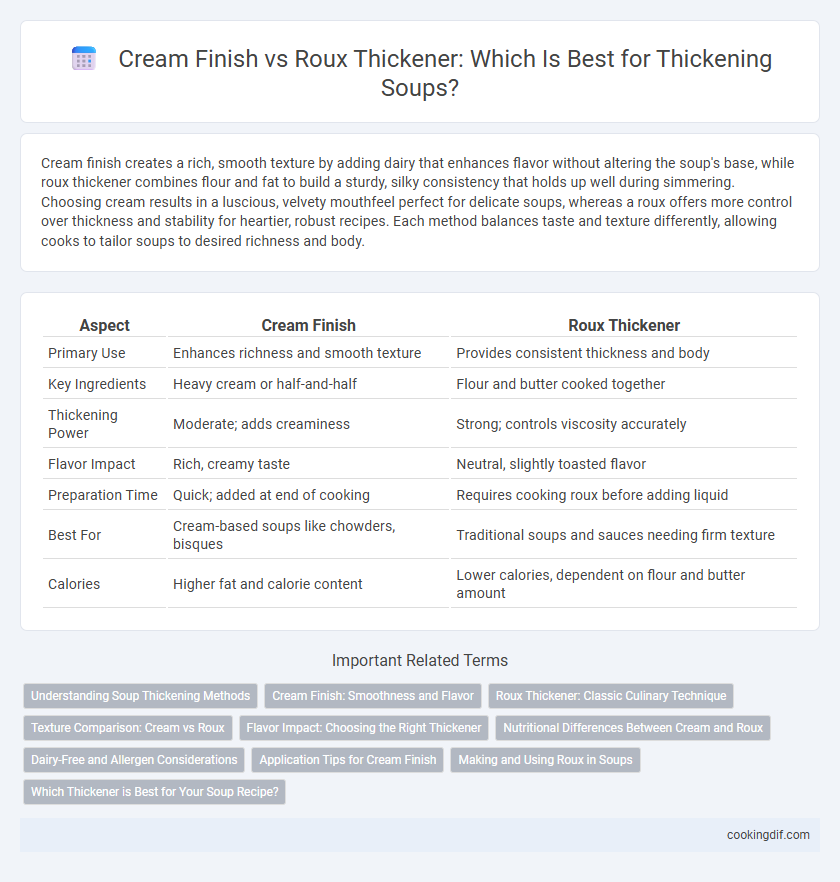Cream finish creates a rich, smooth texture by adding dairy that enhances flavor without altering the soup's base, while roux thickener combines flour and fat to build a sturdy, silky consistency that holds up well during simmering. Choosing cream results in a luscious, velvety mouthfeel perfect for delicate soups, whereas a roux offers more control over thickness and stability for heartier, robust recipes. Each method balances taste and texture differently, allowing cooks to tailor soups to desired richness and body.
Table of Comparison
| Aspect | Cream Finish | Roux Thickener |
|---|---|---|
| Primary Use | Enhances richness and smooth texture | Provides consistent thickness and body |
| Key Ingredients | Heavy cream or half-and-half | Flour and butter cooked together |
| Thickening Power | Moderate; adds creaminess | Strong; controls viscosity accurately |
| Flavor Impact | Rich, creamy taste | Neutral, slightly toasted flavor |
| Preparation Time | Quick; added at end of cooking | Requires cooking roux before adding liquid |
| Best For | Cream-based soups like chowders, bisques | Traditional soups and sauces needing firm texture |
| Calories | Higher fat and calorie content | Lower calories, dependent on flour and butter amount |
Understanding Soup Thickening Methods
Cream finish thickens soup by adding richness and smoothness through dairy fats, enhancing flavor while providing a velvety texture. Roux thickener, a cooked mixture of flour and fat, develops body and viscosity by gelatinizing starches, yielding a more robust and stable consistency. Understanding these methods allows precise control over soup texture, balancing creaminess with thickness based on desired culinary outcomes.
Cream Finish: Smoothness and Flavor
Cream finish imparts a rich, velvety smoothness to soups, enhancing mouthfeel while preserving delicate flavors. Unlike roux thickeners, cream blends seamlessly without altering the natural taste profile or introducing a floury texture. This method intensifies the soup's creaminess, creating a luxurious and well-balanced flavor experience.
Roux Thickener: Classic Culinary Technique
Roux thickener, a classic culinary technique, combines equal parts flour and fat cooked to form a flavorful base for soups and sauces, providing both texture and depth of flavor. Unlike cream finish, which adds richness and smoothness, roux creates a stable, glossy consistency without overpowering the dish's original taste. Its versatility and long-standing use in French cuisine make roux a preferred choice for thickening hearty soups and bisques.
Texture Comparison: Cream vs Roux
Cream thickener imparts a smooth, velvety texture to soups, offering a rich and luxurious mouthfeel due to its high fat content. Roux thickener, made from flour and fat cooked together, provides a more structured, slightly denser texture that adds body without overwhelming richness. The choice between cream and roux significantly influences the final soup consistency, with cream delivering silkiness and roux creating a hearty, robust thickness.
Flavor Impact: Choosing the Right Thickener
Cream finish adds a rich, smooth texture with a subtle sweetness that enhances the natural flavors of soup without overwhelming them. Roux thickener, made from cooked flour and fat, imparts a slightly nutty depth and creates a velvety consistency, balancing heartiness with complexity. Selecting between cream and roux depends on the desired flavor profile and richness, as cream offers a more delicate taste while roux contributes robust, toasted notes.
Nutritional Differences Between Cream and Roux
Cream finish adds richness and higher calorie content due to its fat and dairy components, contributing vitamins A and D, whereas roux thickener, made from flour and fat, introduces carbohydrates with minimal vitamins but adds some protein and fiber depending on the flour type. Roux offers a lower fat alternative, making it suitable for reducing saturated fat intake, while cream provides a smooth texture with added calcium and beneficial fatty acids. Choosing between cream and roux impacts the soup's macronutrient profile, influencing calorie count, fat content, and micronutrient contributions, especially in vitamins and minerals.
Dairy-Free and Allergen Considerations
Cream finish provides a rich, velvety texture to soups but often contains dairy, posing challenges for those with lactose intolerance or milk allergies. Roux thickener, made from flour and fat, offers a dairy-free alternative that effectively thickens soups without introducing common allergens. Opting for a roux is ideal in allergen-sensitive environments, ensuring creamy consistency without compromising dietary restrictions.
Application Tips for Cream Finish
Cream finish thickening works best when gently warmed to avoid curdling and ensure a smooth texture. Gradually whisk the cream into the soup near the end of cooking to maintain its rich consistency without breaking down. Avoid boiling after adding cream to preserve flavor and prevent a grainy finish.
Making and Using Roux in Soups
Making and using roux as a thickener in soups involves cooking equal parts flour and fat (usually butter) until it reaches the desired color, from blonde to deep brown, which affects the flavor and thickness. The roux is gradually whisked into the soup base to prevent lumps, providing a smooth and rich texture that enhances the body of creamy soups, stews, and bisques. In contrast to cream finish thickeners, roux offers a more robust, layered flavor profile and greater control over consistency due to its toasted flour base.
Which Thickener is Best for Your Soup Recipe?
Cream finish adds a rich, velvety texture to soups, enhancing flavor without altering the base ingredients, making it ideal for dairy-based or delicate soups. Roux thickener, a cooked blend of flour and fat, provides a robust, consistent thickening agent suitable for hearty, savory soups like gumbo or chowders. Choosing the best thickener depends on your soup's flavor profile and desired texture--cream finish works well for smooth, creamy soups, while roux offers a more structured, dense finish.
Cream Finish vs Roux Thickener for thickening Infographic

 cookingdif.com
cookingdif.com